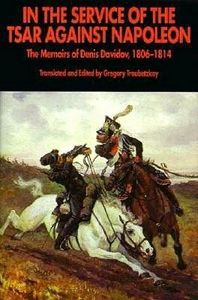Denis Vasilyevich Davydov (Russian: ????? ?????????? ???????) (27 July [O.S. 16 July] 1784 — 4 May [O.S. 22 April] 1839) was a Russian soldier-poet of the Napoleonic Wars who invented a specific genre — hussar poetry noted for its hedonism and bravado — and spectacularly designed his own life to illustrate such poetry.
Davydov stemmed from a great family of Russian nobility. After gaining celebrity as an indefatigable guerrilla leader of the Russian Patriotic War, he became one of the most popular men in the country. Young men of Pushkin's circle viewed him as a model romantic hero and the Decembrists prized his company as well.
Davydov's poems read like a diary of the hussar and bon-vivant that he was. Admired by Belinsky for their organic quality and Russianness, they address such themes as courage in battle, harlots, vodka, and the value of true friendship. In them he sings the praise of reckless valor, on the field of battle as well as before the bottle.
The diction in some of his poems is rather unconventional, and occasionally his words have to be replaced by dots, but it is always full of spirit and great rhythmical go. His later poems are inspired by a late love for a very young girl. They are passionately sentimental and as vivid and alive in diction and rhythmical elasticity as his hussar verses. Pushkin had a high opinion of his poetry and used to say that Davydov showed him the way to be original.[1].
The literary mask of a dashing hussar is belied by some of Davydov's lesser known writings. He brought out an Essay towards a Theory of Guerilla Warfare (1821) and Some events from the life of Denis Vasilievich Davydov, a series of recollections on military life, used by Leo Tolstoy in writing War and Peace. Davydov even makes an appearance in Tolstoy's novel in the person of Vasily Denisov. According to D.S. Mirsky, "in his autobiography he indulges in a veritable orgy of puns and jokes not always in the best of taste. His military writings are fresh, vigorous, and racy; and his memoirs contain some of the best military reading in the language"[2]
Denis Vasilievich Davidov
(1784-1839)
n 1807 Davidov took part in the war against Napoleon as an Aide-de-Camp of Bagration and distinguished himself many times. He participated in the battle at Preisish-Elou. After this campaign he fought in Finland (1808-1809); and in 1809-1810 he took part in the Russian-Turkish war.
In the war of 1812 Davidov was a distinguished organizer of partisan operations in the enemy rear. At first his detachment consisted of 130 cavalrymen but afterwards it became much bigger.
In 1813 Davidov took part in the defeat of Saxonians at Kalish and with his advanced detachment captured a suburb of Dresden.
In 1827 Davidov took part in the Russian-Persian war.
In 1832 he published his collected verses with his very interesting autobiography. In the same year Davidov retired in the rank of General-Lieutenant and lived in his village. He continued to write verses and wrote some amorous songs and the much-talked-off "Modern Song" (1836) in that he scoffed at the rear soldiery and ostentatious liberalism of the nobiliary salons of that time.
Denis Davidov was an officer of hussars, a partisan, a Russian hero and the inspiration for the character Denisov in Tolstoys epic War and Peace. Here, for the very first time in English, are his captivating memoirs which, with dash and lan, convey the Russian perspective on this cataclysmic conflict. Davidovs memoirs cover the confrontation between the French and Russians in Prussia in 18067, including the horrific battle of Eylau; the Russian invasion of Finland in 1808; the French invasion of Russia in 1812; and the War of Liberation in Germany in 181314. The memoirs cover the 1812 campaign in particular in great detail as it was here that Davidov made his legendary reputation. Gregory Troubetzkoy is an expert on Russian aspects of the Napoleonic Wars.
\
